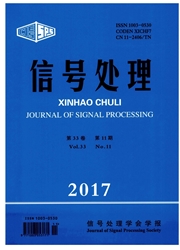

 中文摘要:
中文摘要:
利用目标信号的先验稀疏性,通过压缩感知(Compressive Sensing,CS)方法可以实现对目标的稀疏成像,获取其空间散射结构。该文将CS理论应用于车载前视步进频率超宽带探地雷达(Vehicle-mounted Stepped-frequency Forward-looking Ground Penetrating Virtual Aperture Radar,SFGPVAR)系统,通过电磁建模,指出金属地雷目标可近似为具有旋转不变性的对称圆柱体,在对电磁仿真和实测数据分析的基础上,得到超宽带SFGPVAR系统中金属地雷具有孤立的双散射点结构,在成像空间满足稀疏分布条件,因此利用CS算法可以实现地雷空间散射结构的提取。该文最后通过对SFGPVAR系统实测数据处理验证了CS算法提取地雷散射结构的可行性以及地雷双散射点结构特征的稳健性,该方法不仅拓展了地雷目标特征提取的新思路,也为具有简单离散散射结构目标的检测鉴别探索出一条新路。
 英文摘要:
英文摘要:
Based on the sparse characteristics the Compressed Sensing(CS) technique can achieve the sparse image and scattering structure of the target.In this paper the CS technique is applied in the Vehicle-mounted Stepped-frequency Forward-looking Ground-penetrating Virtual Aperture Radar(SFGPVAR) system as well.The electromagnetic model of the landmine can approximate to be a symmetrical cylinder with isotropic characteristic.Based on analyzing the results of simulations and experiments the metal landmine has the structure of two isolate point scatters.This satisfies the sparseness required by the CS in the imaging space,and as a result of that the structure of landmine can be extracted by the CS algorithm.At the end of this paper the feasibility of the CS algorithm on the scattering structures extraction of the landmine and the stability of the landmine feature with two point scatters are proved by the experiment data from the SFGPVAR system.This novel approach not only extends a new way for the feature extraction of landmine,but also discovers a new approach of detection and classification for the targets with simple scattering structures.
 同期刊论文项目
同期刊论文项目
 同项目期刊论文
同项目期刊论文
 Along-track motion compensation approach for airborne wide-beam SAR based on sub-aperture processing
Along-track motion compensation approach for airborne wide-beam SAR based on sub-aperture processing 期刊信息
期刊信息
